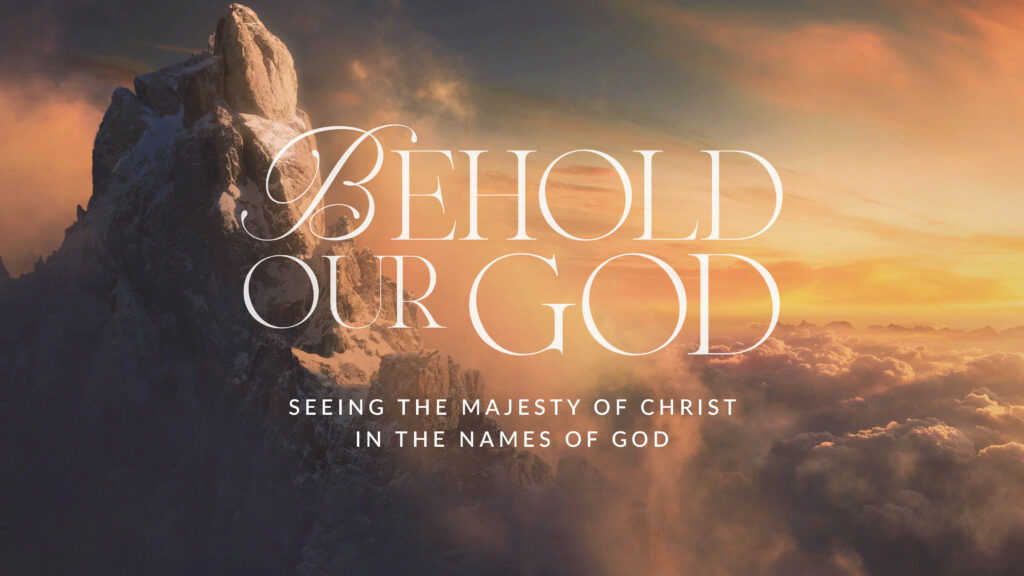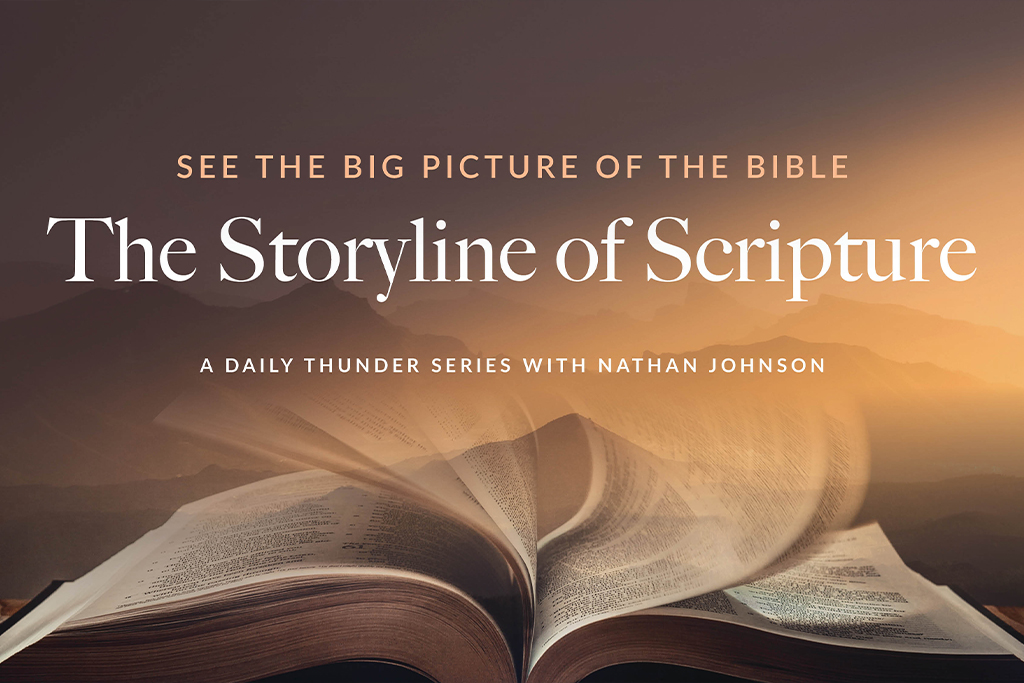
A Daily Thunder Series with Nathan Johnson
Behold Our God
Seeing the Majesty of Christ in the names of God
Part 1: Behold Our God
The Psalmist declares that the name of our God is majestic, it stirs up and fills us with awe. Yet for too many of us, God’s name is just a label; a title we toss out when we need something. But what if our God desires us to know Him relationally and has given us intimate access to Himself by giving us His names? In this first episode of a new series, Nathan Johnson talks about the importance of names in the Bible, why God gives us multiple names for Himself, and four things that will happen in your life when we know His names. Come, let us behold our God.
Part 2: The Primary Names
While God has hundreds of names that reveal His nature and character, there are three that are considered His primary Names—Elohim, Yahweh, and Adonai—and these three establish the foundation for every other name of God. In this episode, Nathan gives seven amazing truths of what it means for us to know our God through these three names.
Part 3: Jehovah Rapha (Healer)
God is a healer and delights in healing! After crossing the Red Sea, the Israelites found themselves in a desperate situation in the desert without water. The only water around was polluted and bitter. In a profound picture of the Gospel, God healed the water and made it sweet. In this message, Nathan discusses God’s name Jehovah Rapha (The Lord Who Heals) and shows how God was, is, and always will be a healer … and perhaps most profound of all, how God longs to take the bitter waters of our lives and not only heal them, but make them sweet.
Part 4: El Shaddai (God Almighty)
There is a twofold profundity with God’s name El Shaddai (God Almighty) – it points to His overpowering strength (like a mountain) and His gentle, nourishing supply (like a mother’s breast). In this message, Nathan examines the name El Shaddai, how it unveils Christ as the all-sufficient one, and four ways we can practically live in light of Jesus being El Shaddai in our lives.
Part 5: jehovah nissi (yahweh is my banner)
In the wilderness, the Israelites were attacked by a fierce enemy, yet God used the weakness of the flesh to demonstrate His strength and victory. This profound picture is still true for us today. In this message, Nathan examines God’s Name “Jehovah Nissi” (Yahweh is My Banner) and explains how the ancient usage of a banner showcases the wondrous position and majesty of Jesus Christ.
Part 6: The Light of the World
God is light and in Him is no darkness at all! This amazing truth is found throughout the Bible in images and descriptions, but finds it fulfillment when Jesus declared, “I am the Light of the world; he who follows Me will never walk in the darkness, but will have the Light of life.” In this study, Nathan illuminates the “light” of God throughout the Old Testament and reveals how it all points to Jesus as THE Light of the World.
Part 7: El Olam (Everlasting God)
God is eternal and everlasting; His ways are sure and His promises guaranteed. This is seen in God’s Name “El Olam,” which reminds us that our God is unmeasured, endless, and everlasting. In this study, Nathan explores this immeasurable Name of God and gives three reminders for how we must live in light of this tremendous reality.
Part 8: THe Holy One (of Israel)
Our God is the Holy One of Israel and He is not only worthy to be praised, but He calls us to be holy for He is holy. In this study on the holiness of God, Nathan examines one of God’s precious names, and explains the only way we can walk in biblical holiness. Rather than a legalistic restriction on the Christian life, truly understanding God’s holiness sets us free to live the most joyful, peace-laden, and free lives imaginable.
Part 9: The Rock
God is “my rock”—our place of strength, security, and safety. Throughout the Bible, God is called the rock of refuge, the horn of salvation, the stronghold, shield, and fortress. These descriptions and titles showcase the immovability, defense, refuge, and rest we find in our Lord Jesus. In this study, Nathan explores the imagery of rocks of Scripture, shows how they deepen our understanding of Jesus Christ, and gives five practical applications for our lives when God is our rock.
Part 10: Qanna (Jealous)
One of our God’s Names is “Jealous”—and while that may sound negative, it is actually a good thing. Though we often see jealousy as a destructive attribute, Scripture reveals that jealousy is an amazing aspect of God’s character. In this message, Nathan discusses why jealousy in relationships is essential and explains why we must understand this attribute biblically. By the end, you will discover the beauty and benefit of this Name of God (Jealous) and learn why God’s jealousy is a really good thing.
Part 11: Netzer (the Branch)
The term “the Branch” is one of the key names for the Messiah in the Old Testament. But far more than a mere twig, the name points not only to Jesus Christ, but also His life, His hometown, His crushing, and the amazing reality that we are grafted into Him. In this study, Nathan Johnson examines the Name of God “Netzer” (the Branch) and shows how this agrarian term shines forth the majesty of Christ.
Part 12: Jehovah Tsidkenu (God Our Righteousness)
Righteousness is mostly foreign or misunderstood in our modern culture; but in God’s economy, righteousness is the bedrock of His Kingdom and what He calls His people to. God Himself is righteous and though we are unable to live righteously on our own, He provides everything necessary to clothe us in His righteousness so that we might live holy, upright, pure, godly lives in this present age. In this study, Nathan explores this deep and powerful concept of righteousness, shows Jesus Christ as the Righteous One, and what His righteousness means practically for our lives today.
Part 13: Jehovah Shalom (God Our Peace)
Our world is craving peace … but true peace is only found in one place. In this message, Nathan examines two names of God: Jehovah Shalom (God Our Peace) and Sar Shalom (Prince of Peace) and explains not only what true biblical shalom is, but how we as believers can experience the fullness of peace every moment of our lives, regardless of the circumstance or situation we find ourselves in.
Part 14: Jehovah Rohi (God My Shepherd)
Several times throughout Scripture, God declares Himself as the Shepherd of His people—and this is most clearly seen when Jesus (Yahweh in the flesh) is called the “Good Shepherd.” In this study, Nathan examines the name of God Jehovah Rohi (God My Shepherd) and shows how we must embrace our sheep-ness if we want to experience the fullness of His shepherding in our lives.
Part 15: El Hesed / Elohe Chasedi (God of Mercy)
One of God’s most amazing and astonishing attributes is His mercy and lovingkindness (“hesed” in Hebrew). This attribute is so central to His nature that when describing His own name, God says He abounds in and keeps hesed (mercy and lovingkindness). In this study, Nathan explores the name “El Hesed” and shows how the incredible nature of God’s mercy weaves throughout Scripture, ultimately finding its fulfillment in Jesus Christ and what He longs to do in and through us.
Part 16: Jehovah Jireh (God will Provide)
God is a provider—He sees the need beforehand and makes provision for it. This has been true throughout Scripture and Christian history, but most clearly seen in Abraham’s willing sacrifice of Isaac. When God stays the hand of Abraham and provides the ram in the thicket, Abraham declares that God is “Jehovah Jireh” (Yahweh Will Provide). In this study, Nathan examines Genesis 22, shows the incredible parallel with Jesus Christ, and reminds us all that we, like Abraham, must live by faith and stand upon the character and promises of God.
Part 17: The Scarlet Worm
Worms are ugly, helpless, unwanted, insignificant, and too many, rather gross. Yet, Jesus is called a worm in Psalm 22. But interestingly, the worm mentioned isn’t a normal worm. In this study, we examine the grand nature of our Savior in light of the worm (specifically the scarlet worm) and show several places in Scripture that highlight God’s incredible heart through an insignificant worm.
Part 18: Jehovah Shammah (The Lord is There)
Despite being at the low point in Israel’s history, Ezekiel declares that the city of Jerusalem was going to be known as the place where God dwelt—Jehovah Shammah (The Lord is There). But God has always been looking for a dwelling place; ultimately desiring to dwell within His people. In this message, Nathan talks about God’s Name “Jehovah Shammah” and discusses how we have become that dwelling place, for the glory, honor, and majesty of Jesus Christ.
Part 19: El Ro'i (The God who Sees Me)
God doesn’t merely see all things … He see me personally. This profound truth becomes clear in Hagar’s encounter with the Living God in Genesis 16, giving Him the name El Ro’i (The God Who Sees Me). While insignificant and mistreated, this name reminds us that God sees even the lowest and insignificant individual. In this study, Nathan examines this incredible name of God in light of Hebrews 4 and Psalm 139 and suggests that the question is not so much “does God see me?” as much as “do I want Him to see me?”
Part 20: Amen, The Faithful God
God’s faithfulness truly is great—He is constant, steadfast, and trustworthy. Yet, this incredible attribute of God is more than an aspect of His nature, it is one of His names—He is the Faithful God. In this study, we examine three names of God (The Amen, The Faithful God, and The Faithful and True Witness) and look at two ways in which we behold God’s faithfulness. Let us stand in awe and declare “Great is Your faithfulness!”
Part 21: El Elyon (God Most High)
God sits in the position of “most high” above all else. There is none like Him and He is exalted above all creation. The name El Elyon (God Most High) bespeaks of God’s “highness” and the fact there is none like Him. In this study, Nathan examines the beauty of El Elyon and how we—like Satan—attempt to put ourselves in God’s “most high” position. He also gives three practical ways that affect our daily lives when we allow Jesus Christ to be our Most High God.
Part 22: Elohim Chayim & El Chuwl (The Living God Who Gave You Life)
God is the Living God who sustains and brings forth life within us. In this study, Nathan examines an amazing series of God’s names that point to life and what God has done within us through the Cross of Christ. Throughout the message, you will be freshly encouraged and reminded that you are chosen by God, not an accident, and therefore God created you with a purpose to demonstrate and declare His life through your own.
Part 23: Jehovah Sabaoth (the Lord of Hosts)
As Jehovah Sabaoth (Tsebaoth), our God is not only a warrior Himself, but He is also the commander of armies (Lord of Hosts). This name of God speaks of His military power and strength, and how He is absolute, sufficient, and superior to all else. In this study, Nathan examines this powerful name and gives three ways we should respond to the truth that Jesus is Lord of Hosts.
Part 24: The Ancient of Days
God is called the “Ancient of Days” in the book of Daniel. This seemingly abstract name showcases God’s timeless nature, His infinite wisdom, and His righteous judgment. In this study, we explore Daniel 7 and examine the nature of God, how Revelation reveals Jesus as the Ancient of Days, and three ways we should respond to Him in light of this wondrous name.
Part 25: Go'el (Redeemer)
Throughout Scripture, God is called the Redeemer of Israel—the One who rescues, purchases, and ransoms His people. This climaxes in the New Testament as we see Jesus, the Redeemer, laying down His life to save humanity from sin and death. In this study, Nathan examines the concept of redemption throughout Scripture and how it leads us to see the majesty of Jesus Christ and His work upon the cross. May we, like Job, declare, “I know that my Redeemer lives …”
Part 26: Immanuel (God with Us)
Our God is with us! This incredible truth should be a bedrock for our faith—we do not have a distant God, we have a God who is near, intimate, relational, and given us everything we need for life and godliness. In this study, Nathan examines the name “Immanuel” (Emmanuel) and discusses three amazing realities for what it means for God to be with us.
Part 27: Hashem (the Name)
Jesus’ Name is above every other name—He has the position of all authority, power, and honor. As we come to the final two studies in our Names of God series, we examine what it means for Jesus to have “THE Name” (Hashem) and three beautiful aspects of such a name that should evoke praise, worship, and adoration as we see His majesty on high.
Part 28: Bearing His Name
As we conclude this series on the Names of God, Nathan briefly ponders some of the Names we didn’t have time to cover and discusses two critical passages on God’s Name—the Ten Commandments and the command to not take God’s Name in vain, and Jesus’ model prayer to “hallow” the Name of God. In short, this study focuses on what it means to bear God’s Name rightly in our lives (and the secret to do so), how to “hallow” (keep His Name holy), and what it actually means to not take His Name in vain (it’s far more than swearing).
Part 29: Yahweh Tikvah (Lord our Hope)
In this special bonus episode, recorded as a Sunday sermon, Nathan look’s at an additional name of God: Yahweh Tikvah (Lord Our Hope).
Christians are the people of hope! Yet biblical hope is not like a Christmas morning desire or wish; rather, it is the joyful and confident expectation, a firm assurance about the future as we wait patiently. For many of us, we place our hope and faith in our careers, money, family, education, or something “us”, but we are called to place our hope in Christ Jesus—He is the source and focus of all hope. In this study we examine the name of God Yahweh Tikvah (The Lord Our Hope) and discover that what we place our hope and future expectation in actually matters








